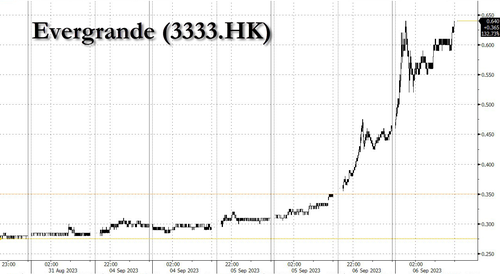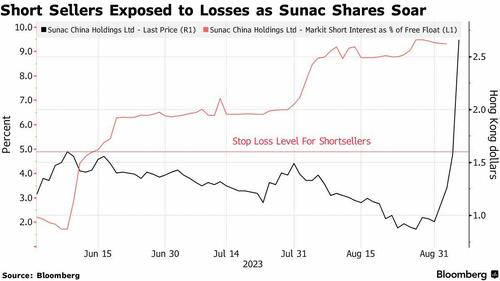Bankrupt Evergrande Surges By The Most On Record After Brutal Short Squeeze
Last week, just as the stock of recently bankrupt Chinese property giant Evergrande reopened for trading after being halted for two years, and plunged 87% in Hong Kong trading, we said that – as has become the norm in this broken market – a squeeze is imminent.
*EVERGRANDE FALLS 87% IN HONG KONG AFTER STOCK RESUMES TRADING
Just wait for the squeeze
— zerohedge (@zerohedge) August 28, 2023
We didn’t have long to wait, and on Wednesday, the newly bankrupt Evergrande closed up 83%, its biggest surge since its 2009 listing, as a frenzy of speculative retail bets that Chinese authorities will widen support for the property sector sent some of the country’s ailing developers surging by the most on record. For those who waited the 10 days for the squeeze and doubled their money, congrats.
The Bloomberg China builders index gained nearly 10% Wednesday, the most in more than a month as heavily indebted developers, most of them near bankruptcy and with depressed valuations, were among those to rally the most, with Sunac China Holdings Ltd. soaring 68% alongside a spike in trading volume. China Evergrande Group
The sudden upturn comes after a rout in August, when the property sector showed signs of deepening financial problems. As discussed on Monday, authorities introduced bolder measures in recent weeks to put a floor under the crisis, including lower down payments and looser mortgage rules for some homebuyers.
The latest boost came from a Securities Times article, which went a step further to say China should drop home-buying restrictions in most regions other than top-tier cities.
“It’s some hedge funds speculating on more stimulus,” said Xin-Yao Ng, investment manager of Asian equities at abrdn Asia Ltd. “The distressed developers are definitely the speculators’ pick to bet on stimulus as they see the biggest delta to policy news.” Alternatively, they just read our tweet.
According to Bloomberg “the magnitude of the rally suggests some investors see a glimmer of hope from the government’s latest efforts, though whether the measures will succeed in reviving the sector remains in doubt.” Alternatively, the magnitude of the rally merely shows how many shorts had piled into the sector and were furiously squeezed, especially with prices in the pennies.
A record wave of developer defaults has pushed many of them to mere penny stocks, whose shares trade at around one Hong Kong dollar. Such cheap valuation subjects them to volatile moves on any potential catalysts. The property gauge now trades at a price-to-book ratio of 0.3, compared with a five-year-average of 0.47. Even with this week’s gains, the index remains more than 30% below this year’s high in January.
Shares of Country Garden Holdings Co., once the country’s largest property developer, now trade at around HK$1.2 apiece, about 8% of their peak level. Wednesday’s 21% jump, accompanied by a record trading volume, only added around $750 million in value to the battered company’s market capitalization.
“If you ask me if this sector is worth buying – for investors, it’s a no. For speculators, it’s a yes,” said Kenny Wen, head of Investment strategy at KGI Asia Ltd. “It’s likely that we see other property developers having new crisis through the end of this year. China’s property trouble is not solved completely.”
The punchline came from Steven Leung, executive director at UOB Kay Hian, who – 2 weeks after we said to brace for a brutal squeeze – said that the rally may be driven by short squeeze of some heavily-shorted names. The major gainers are mostly small- and medium-sized developers which tend to have big swings, he said.
Meanwhile, the broader equities market was muted, another evidence that investors expect the sector’s rebound to be fleeting. The CSI 300 benchmark of onshore shares was down 0.2%, while the Hang Seng China Enterprises Index climbed 0.1%. Distressed chinese high-yield dollar bonds, mostly issued by developers, were also largely unchanged with little liquidity Wednesday, according to credit traders. Country Garden’s dollar bonds still trade at deeply distressed levels around 9-14 cents on the dollar despite a recent rebound, indicating investors remain on edge about the risk of an eventual default.
Investor attention will likely turn next to any signs of recovery in housing demand, according to Willer Chen, senior analyst at Forsyth Barr Asia.
“The high frequency sales data in the next two weeks is crucial for investor judgment on whether the policy is helpful enough,” Chen said.
Tyler Durden
Wed, 09/06/2023 – 12:05
via ZeroHedge News https://ift.tt/xw0RKyi Tyler Durden


